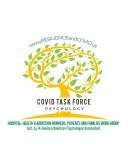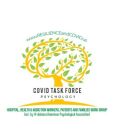Addiction
On St. Patrick’s Day, Be Truly Radical—Celebrate Sobriety
Why, during an addiction epidemic within a pandemic, choosing sobriety is smart.
Posted March 15, 2021 Reviewed by Devon Frye
This post was written by Patricia A. O’Gorman, Ph.D., Co-chair of the Hospital, Healthcare, and Addiction Workers, Patients and Families working group of the COVID Psychology Task Force (established by 14 members of the American Psychological Association), which sponsors this blog.
St. Patrick’s Day has developed a reputation as a day of freedom from all restrictions, a day of indulging without consequences.
No other day invites such frequent and intimate contact with strangers, as demonstrated by the sayings frequently found on T-shirts, hoodies, beer coasters, and painted on bar walls that proclaim:
- Kiss Me I’m Irish
- Rub Me for Luck
- Let the Shenanigans Begin
- No Pinchy, Pinchy
- Get Lucky Here
No other day encourages not just drinking but intoxication:
- Eat, drink, and be Irish
- You can’t drink all day if you don’t start in the morning
- I don’t get drunk, I get awesome
- Let’s get ready to stumble
- Drink until you start seeing the leprechauns
- God created whiskey to keep the Irish from conquering the world.

Encouragement to Be a Rebel this Year Comes With a Bigger Cost
Implicit in this messaging is an invitation to be part of the "fighting Irish," of joining a tough, powerful group, a notion captured by G. K. Chesterton, who wrote, “The great Gaels of Ireland are the men that God made mad. For all their wars are merry, and all their songs are sad.”
Yes, you can go to war against everything that is holding you down, but what is the cost of doing this by getting drunk and throwing all caution to the wind? Is that really smart, particularly now when we’re making some headway with the pandemic, when vaccinations are becoming a reality? Is it smart to blow it all now?
But the continuing danger of this pandemic hasn’t stopped national and local groups from organizing parties and pub crawls with enticements that read:
- "Socially distant bar crawls" (how will this work?)
- "Take-home cocktails to your tribe of hooligans"
- "The largest daytime party"
- "The best day to imbibe"
Every year, there appears to be a disconnect between what being Irish is and the encouragement to get drunk, with all the problems that intoxication can bring for many. This disconnect is intensified this year by the encouragement to both become intoxicated and to have physical contact with those not in your household, ranging from neighbors to total strangers, any of whom could expose you to COVID-19.
There is no being "free of consequences" during a pandemic.
We all are living in a pandemic where gatherings of even ten folks are producing an increase in COVID-19 exposure. Yes, even where I live in rural America. After a year of socially isolating to stay safe, do you really want to blow this for one night and possibly contract COVID-19?
Making a Bad Situation Worse: The Addiction Epidemic
We also have an epidemic of addiction within the pandemic. The U.S. is seeing increasing deaths due to alcohol, as one in four people indicate they are already drinking more this year than last and with alcohol sales skyrocketing.
This increased drinking is potentially leading to increasing rates of depression after binge drinking. This depression may be felt as irritability, which is why you wake up during the night after drinking and aren’t able to rest. It is well documented that the euphoria of drinking is followed by a rebound effect, where one’s mood plummets from happy to irritable and sad.
Many of us are already dealing with an increase in depression due to coping with the major life changes brought about by COVID-19. Ask yourself if you want to compound this with getting drunk and deal with all the physical changes that occur from doing so.
Youth drinking is also increasing, with the number of youths who begin drinking with their peers on—you guessed it, St Patrick’s Day—increasing as well.
Increased drinking leads to other issues as well.
We’re gaining weight. It’s not just the calories you take in from drinking; it’s also the calories you take in by increasing your carb intake to mitigate the negative effects of the alcohol. Trying to sop up the effects of too many beers or Irish coffees with extra french fries or a large order of mac and cheese adds a ton of calories.
We’re may also be putting ourselves in increased danger of sexual assault. Women are drinking dramatically more. When women are under the influence, they may be less able to detect the possibility of sexual assault and seek safety.
No, St. Patrick’s Day is not necessarily a day without consequences.
Want to be really radical during the epidemic of addiction within the pandemic? Stay sober. Enjoy a virtual party with friends, if you like.
Make this a year where the Irish toast to your health, Slainte, serves as a reminder to stay healthy—get vaccinated, stay socially distant, and wear that mask—keeping yourself and those you love, safe!
Wishing you Erin go Bragh–long live Ireland—and you!

Patricia A. O’Gorman, Ph.D., is a clinical psychologist with an expertise in women, substance abuse, psychological trauma, resilience, and their relationship, and co-chairs (with Dr. Maureen O’Reilly-Landry) the Hospital, Healthcare, and Addiction Workers, Patients and Families work group, part of the COVID Psychology Task Force (established by 14 members of the American Psychological Association). Dr. O’Gorman formerly served as director of the Division of Prevention for the National Institute on Alcohol Abuse and Alcoholism (NIAAA), was a co-founder of The National Association for Children of Addiction, where she serves on the Advisory Board, is chairperson of the Advisory Board of Horses Healing Hearts, and secretary of the board of the Sober St. Patrick’s Day Foundation. She has held leadership positions in eradicating sexual violence and promoting child welfare.
To join a virtual "Sober St. Patrick's Day," visit www.soberstpatricksday.org
References
Alcohol consumption rises sharply during the pandemic; Heavy drinking by women rises 41%. (2020, October 16). RAND Corporation.
Chesterton, G. K. (2010). The ballad of the white horse. Dover Publication.
Mohler-Kuo, M., Dowdall, G. W., Koss, M. P., & Wechsler, H. (2004). Correlates of rape while intoxicated in a national sample of college women. Journal of Studies on Alcohol, 65(1), 37–45.
Pollard, M. S., Green Jr., H. D., & Tucker, J. S. (2020, September 29). Changes in Adult Alcohol Use and Consequences during the COVID-19 pandemic in the US.
Renzoni, C. Binge drinking isn’t lucky: Sobering St. Patrick’s day statistics. The Recovery Village.




